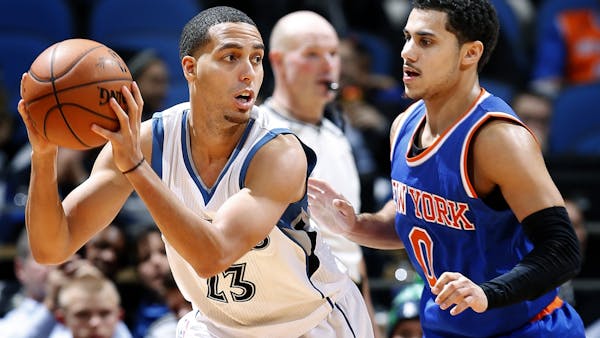It's hardly reinventing the wheel, but NBA coaches from Target Center to Denver and beyond once again are rethinking a tradition: the morning shootaround.
The short workout intended to get players out of bed, moving about and informed about that night's strategies has been the bedrock of NBA gameday life for more than 40 years. But Nuggets coach Brian Shaw has experimented with abolishing the shootaround this season after his team consulted with sleep specialists. Timberwolves coach Flip Saunders recently has done the same, based mostly on a veteran coach's instincts.
Saunders has done so the past three weeks because he believes his many young players remember gameplans better if they receive it during a late afternoon walkthrough rather than in the morning, and because it helps keep a veteran such as much-needed point guard Mo Williams fresher.
"I've done that before," Saunders said. "When I was in the CBA, we hardly ever had shootarounds. There were times here we haven't had them. A lot depends on your team, the feel of your team."
So far, Saunders thinks his players — despite their 7-33 record — plays better if they eat a 3 p.m. team meal together and then walk through plays in a hotel meeting room when they are on the road. They do the walkthrough on their Target Center practice court in late afternoon when they're home.
Shaw believes the same, although a home loss to the Wolves followed by Monday's 43-point defeat to Golden State might make him reconsider a decision he said he has contemplated for some time. He said sleep studies suggest players are better rested and perform better if they're not rousted out of bed in the morning.
"You don't have to set an alarm so much," Wolves forward Robbie Hummel said. "You just sleep until you wake up."
At least younger players do, as well as players who don't have young children.
"I have two kids, I'm used to getting up very early," forward Thaddeus Young said. "They're up at 7 a.m. and I'm getting up, helping put clothes on kids and sending them off to school. But I'm all for not having shootaround. It gives you more rest. I can have breakfast with the kids and go back to bed if I want."
The shootaround roots
Los Angeles Lakers coach Bill Sharman is credited for bringing an hour's morning practice with him from the sport's minor leagues and upstart ABA to the big league in the early 1970s. Somewhat surprisingly, stars Wilt Chamberlain and Jerry West didn't revolt and the Lakers won an NBA title in 1972 for the first time since the franchise moved from Minneapolis.
Other teams soon followed, although today's players almost universally favor reporting for work only once on gamedays in mid-to-late afternoon rather than 10 a.m. or earlier.
"I didn't necessarily hate them when I played, but there were times I didn't particularly care about getting up early in the morning," said Shaw, who played 14 seasons with seven NBA teams. "But I understand the reasoning behind it. I also understand the science behind not having them."
That science revolves around sleep cycles and the belief that players — particularly young ones — perform better and retain game-plan details better if they are allowed to sleep deeper and later.
"It depends on the player," Phoenix coach Jeff Hornacek said. "Some guys, probably veteran players, you can tell them in the morning and they think about the game all day long. Are there that many of those guys in the game today? I don't know. Certainly, some guys benefit from that. Then there are some who by the time they get to the game, they've forgotten all about it."
Wolves rookie Zach LaVine likes the extra sleep and more compact teaching sessions closer to game time, but also likes getting up extra shots in the morning.
"It doesn't matter to me, really," he said.
Saunders credits afternoon sessions with Williams' recent scoring outbursts, including last week's franchise-record 52-point game at Indiana.
"For me, absolutely that's the best thing in the world," said Williams, who at age 32 is the Wolves' oldest player. "I've never been a fan of shootarounds. I like waking up whenever God is waking me up that morning and I'm feeling refreshed."
Once a wake-up call
Shootarounds were standard for decades partly because it was believed they discouraged players from staying out all night if a wake-up call awaited them. That's still a consideration, but times change. Saunders said today's young players are just as likely to stay in, but stay up until 3 a.m. playing video games.
"They're young men, they're going to stay up late anyway," Shaw said. "I've never discouraged them from going out and having a good time. I think you should do that. I also think you should be responsible enough to understand this is your job and you do what you need to do. It's no different if you're a pilot, a truck driver or a doctor who has surgery the next day.
"You're supposed to know the cutoff and when you need to stop doing what you're doing the night before so you're alert the next day."
